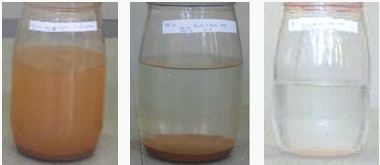What is Sustainable Flocculation and What are Sustainable Flocculants?

What is Sustainable Flocculation?
In most standard drinking water and wastewater treatment systems, there is a flocculation process that is used to reduce the concentrations of solids within the effluent stream.
This particular process makes use of substances that aid in the clumping together of suspended particles among other contaminants in a clarifier system.
Sustainable flocculation involves the utilization of a bio-organic flocculant that is organic in nature, and not primarily composed of conventional metals salts or substances of synthetic origin.
This allows the capability of optimized dosing with enhanced treatment for cleaner and greener water & wastewater.
Additionally, enhanced sludge dewatering and reduced quantities of non toxic sludge provide for significantly lower disposal costs with minimal environmental impact.
What are Sustainable Bio polymer Flocculants?
Sustainable bio polymer flocculants are natural polymers produced by the cells of living organisms. These typically fall under the category of natural flocculants.
There are three main classes of bio polymers. These classes are defined according to the structure of the bio polymer and the monomers used.
The classes are polynucleotides, polypeptides, and polysaccharides.
A primary difference between bio polymers and synthetic polymers can be seen within their structures.
All polymers are composed of repetitive units called monomers. Bio polymers typical have a particular structure, although this is not a distinct attribute.
Many natural bio polymers instinctively bend into characteristic compact shapes, which determine their biological activities and depend in an intricate way on their primary structures.
Structural biology is the examination of the structural properties of bio polymers.
In comparison, most synthetic polymers’ are typical derived from petroleum related products which have uncomplicated but more random structures that are made in laboratories.
Typically, these synthetic polymers are derived from polyacrylamide (PAM) based formulations or PolyDADMAC formulations.
Why does ZeoTurb make for a good sustainable bio-organic polymer flocculant?
What it boils down to is the properties of its constituents.
One reason, its physical and chemical properties have demonstrated efficiency in reducing turbidity, sediment, and trace heavy metal levels.
For another, unlike many other synthetic flocculants and conventional metal salts, Zeoturb is composed of natural and eco-friendly materials and bio-polymer.
Its constituents have excellent adsorbent and cation exchange capabilities.
Polymers are well known in water treatment for their binding capabilities. This NSF international certified sustainable liquid flocculant has an affinity for certain trace heavy metals, organics compounds, TOC, color, and suspended solids which also reduces COD & BOD in wastewater sources.
Its environmental friendly composition and sheer strength keeps the formed particle agglomerations stable.
Sustainable water treatment solutions are becoming more popular than ever due to increasing environmental concerns, a greater focus on public health and sustainability initiatives.This is in addition to more stringent government regulations.
Want to learn more about the use of sustainable flocculants? Interested to learn more about how Zeoturb bio-organic liquid flocculant can help your organization?
Contact the water & wastewater treatment experts at Genesis Water Technologies, Inc. contact us by phone at +1 321 280 2742 or reach out to us via email at customersupport@genesiswatertech.com to discuss your specific application.

